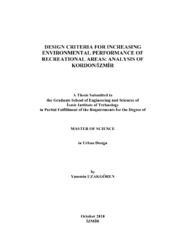Please use this identifier to cite or link to this item:
https://hdl.handle.net/11147/4014Full metadata record
| DC Field | Value | Language |
|---|---|---|
| dc.contributor.advisor | Arkon, Cemal | en |
| dc.contributor.author | Uzakgören, Yasemin | - |
| dc.date.accessioned | 2014-07-22T13:52:58Z | |
| dc.date.available | 2014-07-22T13:52:58Z | |
| dc.date.issued | 2010 | en |
| dc.identifier.uri | http://hdl.handle.net/11147/4014 | |
| dc.description | Thesis (Master)--Izmir Institute of Technology, City and Regional Planning, Izmir, 2010 | en |
| dc.description | Includes bibliographical references (leaves: 119-120) | en |
| dc.description | Text in English; Abstract: Turkish and English | en |
| dc.description | xv, 130 leaves | en |
| dc.description.abstract | In recent years, the increasing scale of urbanization and becoming more distant to our surroundings and ourselves are good reasons to analyze recreational areas. Recreational areas . a type of urban open spaces - are a necessity for human wellbeing that they provide opportunities, or openings, for certain activities, such as play, watching and walking, while the benefits associated with such activities might relate to improved mental and physical health. As planning these areas is not sufficient by itself, design criteria for increasing environmental performance of recreational areas has to be put forward, which is done by this study. This study will focus on environmentally performed urban open spaces on shorelines, and analysis will be carried out on four dimensions of the organization named The Project of Public Space (PPS,) which are formed from the seven dimensions of Lynch. Lynch has defined seven dimensions to analyze the urban space, which are Vitality, Sense, Fit, Access, Control, Efficiency, and Justice. On the other side, PPS.s dimensions are Access and Linkages, Uses and Activities, Comfort and Image, and Sociability. The case study will be about Kordon, known as Kordon 1st (or Atatürk Boulevard) which has a very dramatic history about transforming from a proposed 2x3 freeway to a recreational area. As the actual Structure Plan of Kordon starts from the viaduct shafts at Alsancak Port and ends at Cumhuriyet Square, as of the sit boundaries around the area, this study is also limited between these two landmarks. The objectives of this study have been two-fold. The first is to understand the issues and to establish a knowledge base about the transformation process of Kordon area from proposed Freeway to Recreational Area as an Urban Open Space. The second is to evaluation of Kordon as a recreational area in the light of environmental performance. This study will hopefully be helpful to increase environmental performance of other planned or proposed recreational areas. | en |
| dc.language.iso | en | en_US |
| dc.publisher | Izmir Institute of Technology | en |
| dc.publisher | Izmir Institute of Technology | en_US |
| dc.rights | info:eu-repo/semantics/openAccess | en_US |
| dc.subject.lcsh | City planning--Turkey | en |
| dc.subject.lcsh | Recreation areas--Design and construction | en |
| dc.subject.lcsh | Open space--Turkey | en |
| dc.title | Design criteria for increasing environmental performance of recreational areas: Analysis of Kordon/Izmir | en_US |
| dc.type | Master Thesis | en_US |
| dc.institutionauthor | Uzakgören, Yasemin | - |
| dc.department | Thesis (Master)--İzmir Institute of Technology, City and Regional Planning | en_US |
| dc.relation.publicationcategory | Tez | en_US |
| item.languageiso639-1 | en | - |
| item.fulltext | With Fulltext | - |
| item.openairecristype | http://purl.org/coar/resource_type/c_18cf | - |
| item.openairetype | Master Thesis | - |
| item.grantfulltext | open | - |
| item.cerifentitytype | Publications | - |
| Appears in Collections: | Master Degree / Yüksek Lisans Tezleri Sürdürülebilir Yeşil Kampüs Koleksiyonu / Sustainable Green Campus Collection | |
Files in This Item:
| File | Description | Size | Format | |
|---|---|---|---|---|
| T000888.pdf | MasterThesis | 15.02 MB | Adobe PDF |  View/Open |
CORE Recommender
Page view(s)
96
checked on Jul 22, 2024
Download(s)
76
checked on Jul 22, 2024
Google ScholarTM
Check
Items in GCRIS Repository are protected by copyright, with all rights reserved, unless otherwise indicated.